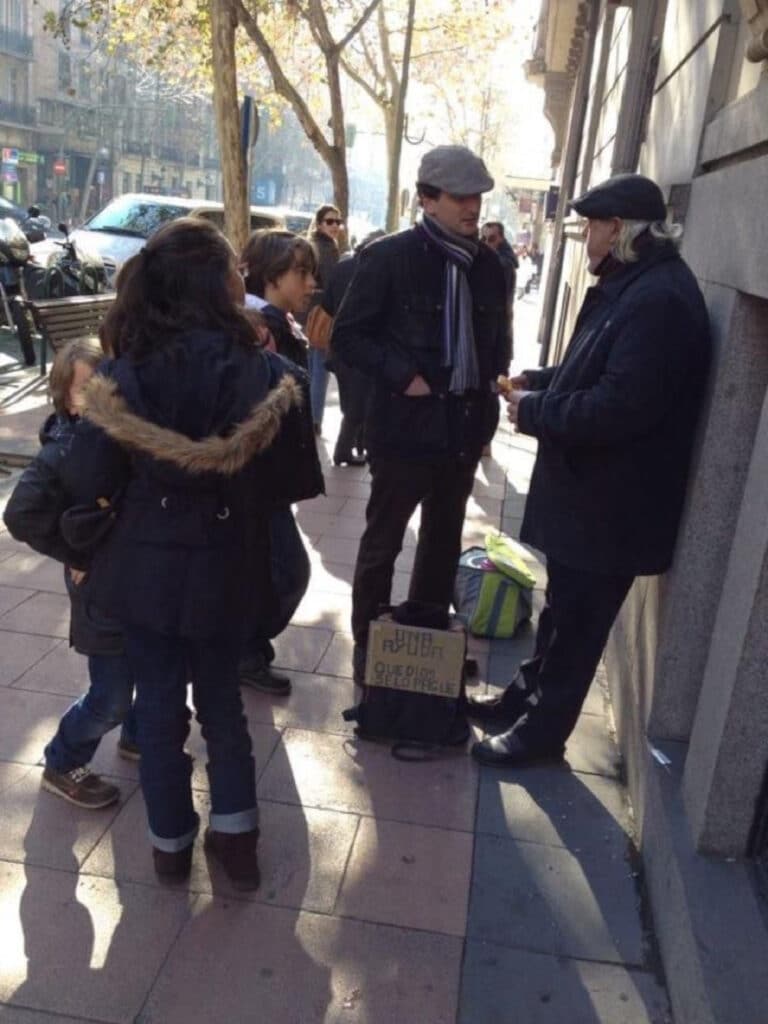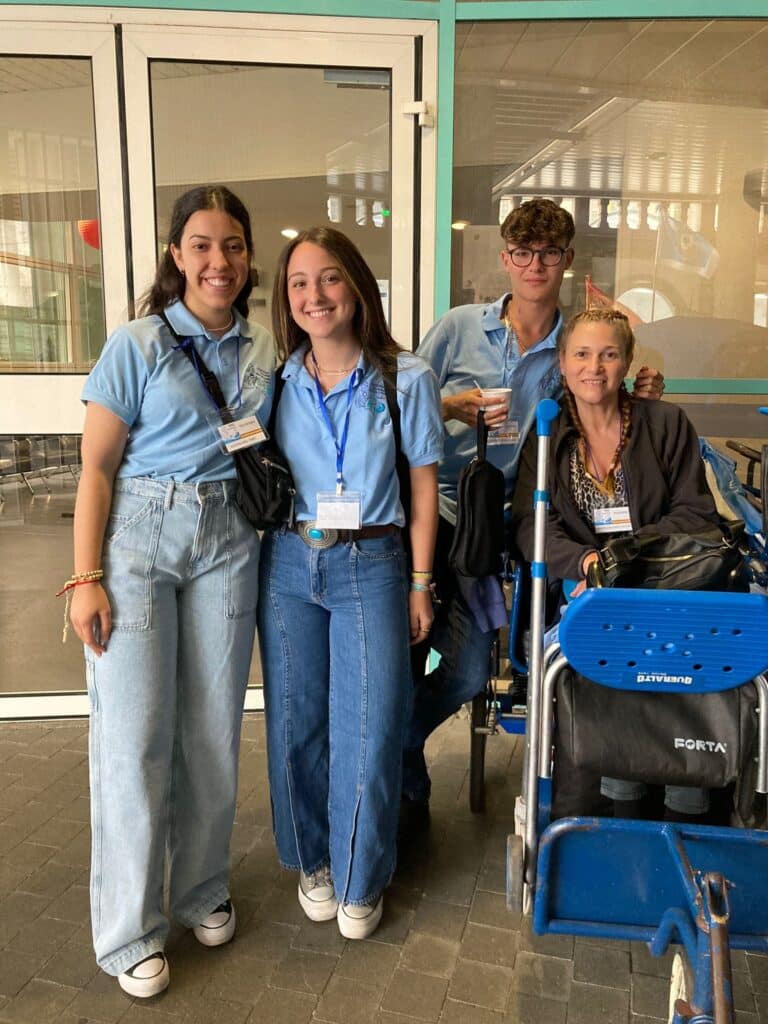Gabriel Tourné, her wife and their children chat with a homeless person in Madrid (photo courtesy of himself)
Tania, her husband and their eight-year-old son live in Melilla, and every Saturday they organize something uplifting to do with the little “troop”(as they call it) they’ve formed of seven Muslim children from their neighborhood, Tesorillo. It’s time for an outing: to the beach, to a museum, to go fishing, to the Parkour championships, to eat halal hamburgers… Yes, the boys -between 8 and 10 years old- have parents, but they’re busy most of the day and the little ones would otherwise stay out late in the streets by themselves.
Spending time with this family, on the other hand, has filled their days with substance, with incentives to grow as people. “For them it’s a treat –Tania tells us–, because if one of them fails a test, or misbehaves, they aren’t allowed to join in on the next outing.” The dynamic of the group flows nicely, and the boys learn about civic virtue: “Last weekend the beach was full of litter, and without me saying anything, they picked it all up and we went swimming afterwards.”

Tania’s eight-year-old son also gets something from the volunteering: “For him it is phenomenal, because after the confinement he was shy and quiet. Now, he shares and experiences things with children from another culture. I’ve taught to him the joy that comes from helping others, from giving something to someone. I’ve passed this on to him, and that makes me happy.”
He went from being closed off towards others, and withdrawn within himself, to being expansive. It is the fruit that comes from giving, and of giving oneself. On the Institute for Family Studies’ blog, American psychologist Erica Komisar underlines the benefits of volunteer activities not only on the receiving end of volunteer work, but also for the volunteer. “The ability to give to strangers is a critical experience for the development of morality, character, and empathy,” she writes.
“Serving together can be a balm against the hardness, insensitivity, and selfishness of the world”
It also has a positive impact on the mental health of the person volunteering. The expert mentions one of her patients’ cases: Tara, a 19-year-old from an intact family. The young woman suffered from depression since she was 15 but recently came out of it as soon as she began volunteering with a foster care agency and found that the only thing that stimulated her sense of well-being was spending time with these children.
No one at home had ever volunteered with her –they were always “very busy”– so Tara regrets not having been put in a position to do something for other people sooner. Since she and her family were theoretically “fine” within their own, small circle, there was no need to leave their comfort zone to interact, for example, with less privileged people.
Komisar stresses the importance of going out and “serving together,” as a family, both for the good it does for third parties and for the good those volunteering receive. Serving together, she tells parents, “can be a balm against the hardness, insensitivity, and selfishness of the world. It’s also a key to not only your children’s mental health but your own.”
Parents and children, on one team
It’s well known: children observe and imitate, and volunteering lends itself as yet another example of this.
In 2003, a study published by the Center for Urban Policy and the Environment, at Purdue University (USA), collected the opinions of families who were fully involved in volunteer activities. “When asked why they volunteer together, adults identified being a good role model and transmitting their values, to have fun, to spend quality time together, and religious reasons.”
When the children were asked the same question, they “identified religious reasons, fun, quality time together, and giving back to the community” but “none of the children identified transmission of values or being a good role model as a reason to volunteer together.” Regarding the advantages of volunteering, the parents identified one fundamental benefit: that their children began to focus on others rather than on themselves. They noted “a change in their children’s attitude toward others,” as well as getting along better with their peers and realizing that they needed each other to be successful. In addition, they were enthusiastic about the fact that volunteering together had “been a bonding experience and they have become more of a team” because of it.
In Madrid, Gabriel Tourné “trains” on one of these teams. It’s made up of his three children, his wife and himself. When the children were 5, 9 and 10 years old, they began taking them out onto the streets, armed with thermoses of coffee and baked goods to offer to people experiencing homelessness.
“It was very curious. Initially, they were afraid of approaching a stranger, and someone who is living on the street, but as we continued and they saw that we spoke naturally with these people, that they hadn’t always lived on the street, and that they had their own stories (sometimes marked by addictions, divorce, a bad relationship with their children), they realized that, of course, they were completely normal people, and there came a time when they fought among themselves to be the one who handed them the food. We did this several times, and our children quickly remembered the names of many of them.”
Gabriel shares that, when his children were older, they began to help out in soup kitchens in the southern part of Madrid, where they interacted with people who, despite having homes, had other needs. Both volunteer experiences, he assures, have made them more sensitive “both towards the people they serve, and towards us”. Serving as a family “makes everyone grow; whenever we see there’s something missing around us, we simply look at each other. There is this understanding between us and them, and we know that they are always willing to help”.
Within the world of pain
At a time when the topics of illness and death are blurred between the impending transhumanist transcendence and the aim of not hurting or traumatizing anyone – especially when it comes to children– there is a danger of ignoring these realities and leaving the youngest among us without the skills to respond to these situations, which, sooner or later, but always invariably, they will have to face.
Not having grandparents under the same roof can lead to young people’s disengagement with those who are vulnerable
“When we deprive ourselves or our children from contact with those in need or in pain, we deprive ourselves and them of a rich experience of human connectivity and purpose,” Komisar writes.
The fact that so few young children and adolescents live in the same home as their grandparents does not particularly help the situation. Saenz de Jubera et al. (2019) found that only 7.3% of Spanish families have grandparents, parents and children (of high school age) under the same roof, while in the US, an investigation by North Dakota State University of 2020 data found that only one in 10 minors live in a home with at least one grandparent. It could be deduced that, since so many children are unfamiliar with the fragility that comes with aging, they don’t have many first-hand experiences about how to interact with people in situations like this or in similar ones.
Muhammad must come to the mountain: go to those who are sick and take your children with you. Ana María García lives in the Portuguese city of Ourem. She volunteers with the elderly at the Senior University and at the Rio de Couros Day Center. And she goes with her 9-year-old son.
“I think this has made him a very gentle and attentive person. I’ve seen it in his sensitivity towards human suffering and sadness. Wherever he goes, he looks for the person who’s suffering and shows empathy.” Later, at school, he harnesses these experiences and uses them in his essays, or talks about them. His relationship with his mother has become even stronger as a result: “He feels proud of me when he goes with me.”
As for Chucena, Huelva, native Inma Cobos, she has five children (from 12 to 21 years old) and they all belong to the Diocesan Hospitality Group of Lourdes. They frequently visit nursing homes and centers for the disabled: “My children love to go and share with them. Depending on the rules of each center, we do one thing or another. From helping make food, to serving it or feeding those who need help eating; they take residents out for walks, change their diapers if necessary… They’re happy to do it, and go about it quite naturally. Personally, I have tried to help them see it as a service to Christ. To see everything they do from a faith perspective, and as doing good for others”. Furthermore, once a year, when a bus of sick people travels to France, to the sanctuary of Our Lady of Lourdes, her children go to help. “You’ll never hear them complain. They’ve been going for three years, and every year want to go back. We could go on vacation somewhere else, but they love Lourdes. They really enjoy it.”
And maybe it’s because they know that today’s typical shows of “solidarity” on social networks –a sad emoji under the photo of a starving war refugee or someone with a profound disability– is indeed quicker, but that any empathy is left behind as soon as you continue scrolling. Directly visiting, seeing, touching, cleaning, feeding, is perhaps more ennobling, and more useful, and brings us closer…
Our children are watching us.
Translated from Spanish by Lucia K. Maher

